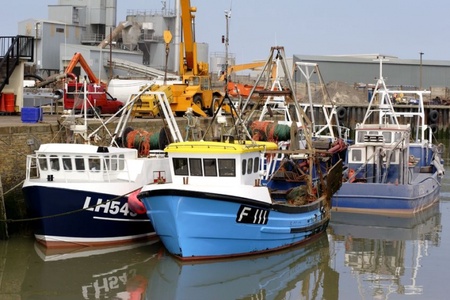A collaborative research project between the University of Aberdeen and University of the West of Scotland (UWS) focusing on the process and consequences of the UK leaving the European Union is among only 25 to be awarded highly competitive funding by the Economic and Social Research Council (ESRC) as part of The UK in a Changing Europe initiative.
The project explores UK Fisheries Policy Post-Brexit.
The ESRC has funded projects exploring a wide range of issues including: the public’s Brexit preferences, the impact of Brexit on stability and peace in Northern Ireland, to its effect on trade, agriculture, migration and the lives of expats and European families living in Britain.
The research team is made up of Dr Craig McAngus (Department of Politics and International Relations, Aberdeen University and project lead) and Dr Arno van der Zwet and Dr John Connolly (both from the School of Media, Culture and Society at University of the West of Scotland). The team has considerable expertise in the areas of fisheries policy, British and European governance and politics.
Dr McAngus said: “The decision to leave the EU will have a profound effect on the way in which a multitude of policies are implemented in the UK. Fishery policy is a most pertinent example of a policy area that is likely to undergo significant changes.
“The Common Fisheries Policy (CFP) has regulated the fishing industry since the UK joined the European Economic Community (EEC) in 1973. When the process of leaving the EU is complete, the CFP will no longer apply to the UK. Indeed, the UK will be responsible for governing its own territorial waters.”
As part of the research, the team will explore the added complexity of devolvement in Scotland, Wales and Northern Ireland, which will see the individual governments responsible for fisheries.
“We would presume that once the UK leaves the EU, the Scottish Government will oversee Scottish territorial waters, to take one example,” Dr McAngus added.
“However, it has been suggested that in order to run an efficient and effective fishery policy the UK Government may wish to repatriate powers over fisheries away from the devolved institutions.
“This would be politically very controversial in the context of the Scottish independence debate and this project will examine this tension and how it can be balanced against the need to develop efficient and effective policy in the light of the rescaling of competencies from the EU to the UK.”
One of the main objectives of the research is to analyse and understand the interaction between different levels of government in the UK in the context of fisheries policy.
Dr McAngus said: “Using fisheries as a case study, the project aims to contribute to the academic literature on multi-level governance and rescaling by exploring the need to alter policy realities in a post Brexit UK. Besides examining the UK's internal dynamics, the project aims to look overseas to Norway, Iceland and the Faroe Islands; states and territories who are outside the EU but who govern their own territorial waters and who negotiate with each other and the EU every year to set the amount of fish that can be caught in particular parts of the seas around Europe.
“Understanding how actors in these countries organise fishery policies will help the project team develop a model of best practice so that government officials, politicians, and the fishing industry itself can learn and adopt these lessons in order to make the transition away from the CFP as smooth and easy as possible.”
Dr Connolly said: “Dr van der Zwet and I are looking forward to working with the University of Aberdeen on this important research project. We see this as just the beginning of what we hope to be a long-term research partnership between our institutions in area public policy and governance research”.
The researchers will work with fishing communities across the UK and host public engagement events to discuss what leaving the EU means for the fishing industry and their communities.
At these events, a series of roundtable focus groups will be held so that members of fishing communities can have their say on the process and outcome of leaving the CFP.
Anand Menon, Professor of European Politics and Foreign Affairs at Kings College London and Director of the UK in a Changing Europe Initiative said:
“I’m delighted to welcome such a range of leading scholars to our team. These new additions will reinforce the ability of the UK in a Changing Europe to respond to the high demand for accurate, research-based information from politicians, civil servants, journalists, businesses, civil society and the public at this crucial moment for the UK.”


